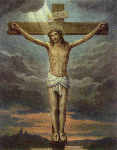
Basic Scripture
By: William G. Most
(c) Copyright by William G. Most, 1993
| HOME |
|---|
CHAPTERS
- Introduction
- A Revolution by Vatican II?
- What is Inspiration ?
- A Revolution by Pius XII?
- Using Genre to defend Inerrancy
- How to Interpret Scripture
- The l964 Instruction of the Biblical Commission
- Which are the Inspired Books?
- The Pentateuch
- Genesis
- Exodus
- Leviticus, Numbers, and Deuteronomy
- Joshua, Judges and Ruth
- Samuel, Kings, Chronicles and Ezra-Nehemiah
- Pre-exilic Prophets
- Exilic and Post-exilic Prophets
- The Psalms
- The Wisdom Literature
- Daniel
- The Two Books of Maccabees
- Judith, Esther, and Tobit
- The Gospels
- The Acts of the Apostles
- St. Paul's Epistles
- The Catholic Epistles
- Study Questions
- Selected Answers
Books/Resources
by Fr. Most
- EWTN Scripture Q & A
- Basic Scripture
- Bible Commentaries
- Our Lady in Doctrine And Devotion
- Outline of Christology
- An Introduction to Christian Philosophy
- The Living God
- The Holy Spirit and The Church
- Catholic Apologetics Notes
Apologetic Resources
- Ask Father
- Biblical Catholicism
- Theology/Philosophy
- Scripture Resources
- Scott Hahns Lectures
- Apologetics Links
Other Services
- Catholic Chaplaincy
- St. Anthony Communications
Introduction
The new Universal Catechism is heavily Scriptural, and loaded with
teachings of the Fathers of the Church. We are now to begin to make a
preliminary exploration of that Scriptural riches. Hence it is good for us
to open with a sketch of what the Catechism says about Scripture and
Tradition.
We begin to know Him and things about Him by reason. The Church teaches,
without endorsing any particular set of proofs, that we can by reason alone
be certain of His existence. And in seeing the manifold perfections of
creatures, we can know that these perfections exist in the highest degree,
and without alloy, in Him.
Christ confided His truths to the Apostles, and commissioned them to teach
others. Sacred Scripture and Sacred Tradition come from the one source, God
Himself. The Church by teaching and by its worship, perpetuates these
truths about Him to every generation.
He gave to us, His people, a wonderful sense to discern what is truly
revealed, so that if the whole Church, people as well as authorities, has
ever accepted a thing as revealed, that belief cannot be in error. However,
the task of giving an authoritative and clear interpretation of the meaning
of both Scripture and Tradition He entrusted solely to the living teaching
office of the Church, whose authority is exercised in the name of Christ.
In fact, it is only through this Church that we can know with certainty
which books are inspired and contain His revelation. There are 46 sacred
books of the Old Testament, and 27 of the New. The central part of these
books is the Gospels, for they speak to us of His Son. These sacred books
contain what He willed us to have for our salvation. This does not mean
that other points may be in error in them. No, everything that is asserted
by the Sacred Writers is asserted by the Holy Spirit. We need the action of
that Spirit to fully understand the deposit of faith.
Since the chief Author of all of Scripture is the Holy Spirit, we cannot
assume that one part of Scripture will clash with another. The unity of the
divine design means that the Old Testament prepared for the New, which
fulfills the Old. So, the two testaments shed light one another.